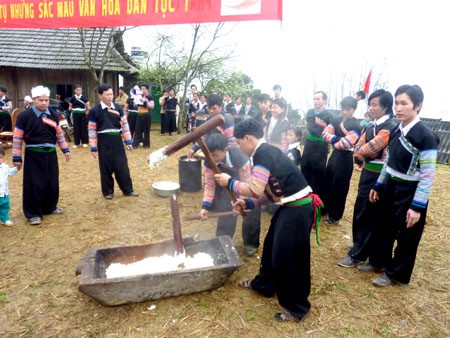(VOVworld) – The Mong people live in clusters of a few households in the high mountains. They pay close attention to protecting their identity and unity. People of the same clan and blood live together so they can count on each other in daily life and production.
 |
| Mong men making sticky rice cake in a spring festival |
The Mong people respect clan relations. They think people with the same ancestors can deliver babies or die in each others houses and always help one another. Each clan gathers in a hamlet and is managed by a head of the clan. He is prestigious, respected, and credible. Mong custom prohibits people of the same clan to marry. If one family in the hamlet has a joyful or sad experience, all the villagers will come to help and consider it their own responsibility.
Sung Thi Ly’s family was celebrating a happy event. Her neighbors came to share the happiness and help her with the cooking. They asked each other about farm work, the children’s health, and assigned people to buy food and cook. Ly said they are all brothers and sisters and they help each other when one family needs help. “The Mong people live together and love each other. The hamlet has few households and we always know about each others’ situation such as having a sick child. Every day after doing their farm work, the women gather to embroider and the men to talk about terraced field work.”
The Mong people live harmoniously with their neighbors. They rarely have a quarrel or threaten others because one of their characteristics is a spirit of compromise. But if strangers threaten their peaceful lives, the community will fight together to defend their hamlet.
Their unity is shown in customs, festivals, worshiping rituals, and marriage rules. When Mong people meet people of the same ethnicity for the first time, they behave as brothers of the same blood. People in the hamlet do not hesitate to help their neighbors build a house, plough the field, or harvest.
Some women came to help Giang Thi Xa plough her field. They would finish the work in two days and help other families in the following days. Xa said: “Today we are weeding and embanking my terraced field. After weeding, we use a buffalo to plow the field. We work from one field the next. It’s tiring but joyful.”
Life has changed but Mong people have maintained a unified lifestyle in protecting forests, water resources, and community. They have built social management models based on a foundation of family hierarchy and prestige.